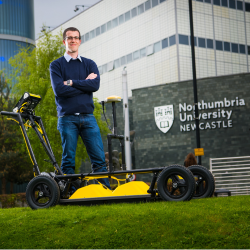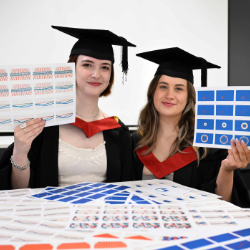-
Study
-
UCAS Clearing 2024
- Clearing Courses
- The Clearing Process
- UCAS Tariff Points
- Clearing 2024 FAQs
- Confirmation
- Clearing Virtual Event
-
Undergraduate
- Search for a Course
- Undergraduate Open Day & Events
- Application Guides
- Northumbria University UCAS Exhibitions
- Foundation Years
- Undergraduate Fees & Funding
- School & College Outreach
- Continuing Professional Development
-
Postgraduate
- Postgraduate Study Degree
- Postgraduate Research Degrees
- Postgraduate Open Days and Events
- Postgraduate Fees & Funding
- Flexible Learning
- Thinking about a Masters?
- Continuing Professional Development
- Change Direction
-
Student Life
- The Hub - Student Blog
- Accommodation
- Life in Newcastle
- Support for Students
- Careers
- Information for Parents
- Students' Union
- Northumbria Sport
-
-
International
International
Northumbria’s global footprint touches every continent across the world, through our global partnerships across 17 institutions in 10 countries, to our 277,000 strong alumni community and 150 recruitment partners – we prepare our students for the challenges of tomorrow. Discover more about how to join Northumbria’s global family or our partnerships.
View our Global Footprint-
Applying to Northumbria
- European Union
- Our London Campus
- Northumbria Pathway
- International Events
- Entry Requirements and Country Representatives
- Regional Offices
-
Northumbria Language Centre
- Faculty Requirements
- Acceptable English Requirements
- Pre-Sessional English and Study Skills
- Academic Language Skills Programmes (ALS)
-
International Fees, Funding & Scholarships
- International Undergraduate Fees
- International Undergraduate Funding
- International Masters Fees
- International Masters Funding
- International Postgraduate Research Fees
- International Postgraduate Research Funding
- International Money Matters
-
Life at Northumbria
- International student support
- Careers
-
International Mobility
- Current Northumbria Students
- Incoming Exchange Students
-
-
Business
Business
The world is changing faster than ever before. The future is there to be won by organisations who find ways to turn today's possibilities into tomorrows competitive edge. In a connected world, collaboration can be the key to success.
More on our Business Services -
Research
Research
Northumbria is a research-rich, business-focused, professional university with a global reputation for academic quality. We conduct ground-breaking research that is responsive to the science & technology, health & well being, economic and social and arts & cultural needs for the communities
Discover more about our Research -
About Us
-
About Northumbria
- Our Strategy
- Our Staff
- Place and Partnerships
- Student Profiles
- Alumni Profiles
- Leadership & Governance
- Academic Departments
- University Services
- History of Northumbria
- Contact us
- Online Shop
-
-
Alumni
Alumni
Northumbria University is renowned for the calibre of its business-ready graduates. Our alumni network has over 237,000 graduates based in 178 countries worldwide in a range of sectors, our alumni are making a real impact on the world.
Our Alumni - Work For Us
What will I learn on this module?
You will refine and build on skills gained in Level 4 to develop character designs through an historical overview of relevant literature, art, animation, games, film and advertising. This will help to form a broad understanding of character design. More specific principles of character design and branding, using characters, will also be introduced.
You will then learn how to generate ideas for contemporary character design influenced by social, political and cultural research for the development of the ‘back story’, through drawing and written work. You will create and present, character design sheets, including suggested movement, expressions, silhouette, negative space and bone structure and create early prototypes of characters using found materials.
You will learn to understand and execute the principles of 3D computer modelling and the principles of 3D texture mapping with a view to establishing an in-depth, practical knowledge of 3D modelling and texturing techniques (using Autodesk Maya), in support of the design and production of original content. You will also learn how to manage 3D CGI assets and realise character design ideas in a range of media to create a character led brand.
How will I learn on this module?
You will learn through the delivery of an initial contextual lecture series and group discussions, to establish an understanding of the history and principles of character design, branding and 3D modelling.
Research exercises will be set to explore the field of character design and a further research exercise will act as inspiration and application for the development of your characters. You will set up, and periodically add this research, set exercises and design development to a blog (with appropriate reflective annotation) as the device to contain and present your work throughout the module.
Academic staff will work with you in practical classes and workshops, and on project supervision within these workshops to facilitate ‘learning through doing’ in the generation, development and presentation of character design ideas.
You will use tutor guided independent study and student independent study, to execute further practical exercises, to realise design ideas through experimentation and exploration.
Technical exercises will also be set to refine 3D modelling skills using the computer facilities. The final task will be to synthesise these technical skills with character designs and then with brand development to produce a character that embodies the ‘essence’ of a brand.
Small group critiques will be undertaken so that you can present and justify your work and critically reflect on your own work and others.
Class presentations will allow you to see the work of peers and learn to critically reflect in a larger forum on what is successful and how to improve your own work. At the group presentations you will also receive formative feedback, which will focus on the conceptual, research and practical design strengths, as well as areas for improvement.
How will I be supported academically on this module?
Module briefs/guides outline the indicative workload of a module with an indication of lectures, design and software workshops. Mini briefs will be issued by the tutor, prompting you to complete exercises by the deadlines set so that you can build on key ideas and principles in the module. These briefs will be uploaded to the eLearning Portal before any module activity commences. Associated learning materials will be available on the eLearning Portal to download and will support your developmental skills. These will be discussed in class first to make sure that you understand the key concepts of the material.
Email support is available throughout the module, especially during tutor guided and student independent learning periods - when you are working alone. You can also make appointments to talk through your work with a member of staff.
The programme has a subscription to ‘Digital Tutors’, the design and technical software support facility, due to the specialist nature of the software that you are required to learn. You will have access to this resource, both inside and outside the university, to help with any problem solving when designing or modelling in 3D. It will include support materials for other creative software such as Adobe CC and Autodesk Mudbox, which will also be required in this module. You will be directed to the relevant Digital Tutors resources on the eLearning Portal, but will be encouraged to solve your own design and technical problems by searching for solutions in Digital Tutors also to encourage independent learning.
The programme also has invested in a 3D printer which can print your models, to support your understanding of 3D space.
What will I be expected to read on this module?
All modules at Northumbria include a range of reading materials that students are expected to engage with. The reading list for this module can be found at: http://readinglists.northumbria.ac.uk
(Reading List service online guide for academic staff this containing contact details for the Reading List team – http://library.northumbria.ac.uk/readinglists)
What will I be expected to achieve?
Knowledge & Understanding:
1. Identify appropriate research and show evidence of critical design development and aesthetic analysis for character design.
2. Show awareness of historical and contemporary character design.
Intellectual / Professional skills & abilities:
3. Generate, progress and communicate design concepts and solutions, through drawing, with traditional or digital technologies.
4. Use tacit and digital design skills in an experimental and innovative way to model characters.
Personal Values Attributes (Global / Cultural awareness, Ethics, Curiosity) (PVA):
How will I be assessed?
You will present your initial, individual research work to the group, early in the semester, you will receive formative feedback here on MLO 2.
During a mid-point presentation, which will focus on the conceptual and practical design strengths as well as areas for improvement, you will receive more formative feedback from tutor and peers by addressing MLOs 1 & 3. You will have an opportunity to reflect on, and respond to, the feedback before submitting the final project assignment.
You will receive formative feedback throughout the module, this consists of group discussions and individual tutorials and this will help you to reflect upon the conceptual and practical elements of your work with a view to addressing MLOs 1 & 3. MLO 4 should be addressed in the second half of the semester when the majority of the modelling takes place.
Following the final project submission, you will receive written feedback on your achievement against all of the MLOs, using the Faculty Feedback sheet and a final grade will be given. Feedback will be provided within 20 working days of submission.
Your work should be submitted via the eLearning Portal. On the module page in the eLearning Portal, there is a folder called ‘Assignment Submission’ you will find all the necessary links in this folder.
Pre-requisite(s)
N/A
Co-requisite(s)
N/A
Module abstract
Please find details of this module in the other sections provided.
Course info
Credits 20
Level of Study Undergraduate
Mode of Study 3 years and 4 months
Location Sri Lanka
City Sri Lanka
Start January
All information is accurate at the time of sharing.
Full time Courses are primarily delivered via on-campus face to face learning but could include elements of online learning. Most courses run as planned and as promoted on our website and via our marketing materials, but if there are any substantial changes (as determined by the Competition and Markets Authority) to a course or there is the potential that course may be withdrawn, we will notify all affected applicants as soon as possible with advice and guidance regarding their options. It is also important to be aware that optional modules listed on course pages may be subject to change depending on uptake numbers each year.
Contact time is subject to increase or decrease in line with possible restrictions imposed by the government or the University in the interest of maintaining the health and safety and wellbeing of students, staff, and visitors if this is deemed necessary in future.
Useful Links
Find out about our distinctive approach at
www.northumbria.ac.uk/exp
Admissions Terms and Conditions
northumbria.ac.uk/terms
Fees and Funding
northumbria.ac.uk/fees
Admissions Policy
northumbria.ac.uk/adpolicy
Admissions Complaints Policy
northumbria.ac.uk/complaints














